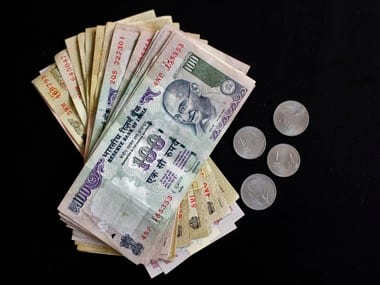The Indian rupee today hit a record low of 61.92 against the US dollar against a previous all-time low of 61.80 despite measuresfrom the central bank to prop up the currency.
Even theBSE Sensex snapped a four-day winning streak and has plunged over 400 points in mid-morning trade to trade below its crucial psychological support level of 19000.
At 10:35 am, Sensex was down 408 points at 18959 and Nifty was down 139 points at 5600.
This is a clear indication that the desperate measures being taken by the government and the RBI have failed to calm both currency and stock markets.
[caption id=“attachment_1037591” align=“alignleft” width=“380”]  Reuters[/caption]
India imposed restrictions on foreign exchange outflows and gold imports on Wednesday in a new attempt to defend the rupee, as a spike in inflation added pressure on policymakers to curb a crippling external deficit.
The depreciating rupee and efforts to control it is now beginning to touch the Indian upper middle class and all of corporate India. Companies until now could spend up to 400 percent of their networth abroad to acquire or expand.The RBI has brought this limit down to 100 percent of net worth. Indians could spend up to 2 lakh dollars a year to finance their children’s education or for any indulgence or even investment. Now they can spend 75,000 dollars a year and they can’t remit dollars to buy land abroad.
However, the RBI’s measures to support the falling rupee are proving to be counter-productive as it has created more panic on Dalal Street. The central bank might induce the very movement of money out of India that it is supposed to prevent as the capital control measures gives the impression that we are back to pre-1991 set of policies.
Even India Inc is irked by the fact that capital control measures were being introduced at a time when India is in dire needs of funding and investment.
“Ironic that we have controls on capital on Independence Day. Feels like the 1980’s. Well the silver lining is that I feel young again!” tweeted Anand Mahindra of Mahindra and Mahindra today.
Morgan Stanley believes the RBI’s capital control measures will make a marginal difference to the balance of payments trend in the near term.
“We expect India to remain exposed to funding risks in the next few months as long as India’s current account deficit remains higher than a more sustainable level of 2.5% of GDP and CPI inflation remains higher than 7%. As long as US Treasury yields keep rising, India will continue to see currency depreciation pressures,” the investment bank said in a report today.
“Even assuming more-than-expected inflows in long term flows in (FDI+ Loans + NRI deposits); there is excessive reliance on “hot money” flows to the extent of $21.3 billion,” said Elara Capital in a note titled “India Confronts the Impossible Trinity.”
The brokerage believes structural reforms likeshifting variousFDIs from approval to automatic route framework would be a ‘game changer ‘as these wouldnot have to pass through the corridors of power in New Delhi orprovincial assemblies.
Experts, however, believe that apart from policy measures, India needs some serious structural reform measures from the government.
And even though though the intent behind capital controls on resident Indians is to stem dollar outflows at a time when the green back is in short supply, RBI has in effectput brakes on overseas ventures and mergers and acquisitions of Indian businesses.
“It’s fire-fighting to save the rupee, but where does it leave my investments if the Indian government suddenly introduces new controls in the future that restrict me from repatriating my profits,” said Boston-based medical equipment manufacturer Harvey Kirpatrick told Firstpost earlier .
As Firstpost said earlier , " RBI measures may curb short-term outflows, but they send a chilling message of serious crisis. The limited freedom that Indians-ordinary citizens and businesses-enjoyed on capital account convertibility is now being rolled back bit by bit. They can’t buy gold without paying more for it; they can’t buy property; and they can’t invest abroad easily to expand business opportunities. India Inc will not be happy."
Even Business Standard noted that the RBI’s latest move gives the impression that our policy makers are helpless and are in dire straits similar to to 1991.
“It would be deeply unfortunate if a weak economy was driven to a crisis purely by the efforts of policy makers seeking to prevent it. The RBI should publicly give up its doomed defence of the rupee. After all, Finance Minister P Chidambaram is right when he told Parliament that the rupee’s level is fixed by various uncontrollable factors. But then he, and the Reserve Bank, should then stop trying to control it. No policy maker knows what the correct level of the rupee is; the market should be allowed to decide,” the BS article said. ( Read the entire piece here.)
The big question now iswill foreign investors stop investing because they may worry about whether more capital controls will be introduced to limit outflows?


)
)
)
)
)
)
)
)
)



